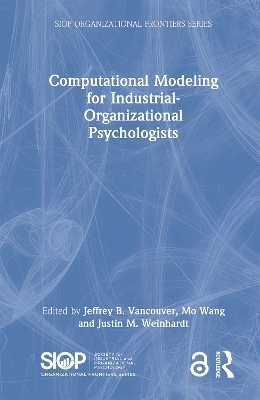
Computational Modeling for Industrial-Organizational Psychologists
Routledge (Verlag)
978-1-032-48375-7 (ISBN)
To move the use of computational modeling forward, the book includes specific how-to-chapters on two of the most commonly used modeling approaches: agent-based modeling and system dynamics modeling. It also gives guidance on how to evaluate these models qualitatively and quantitatively, and offers advice on how to read, review, and publish papers with computational models. The authors provide an extensive description of the myriad of values computational modeling can bring to the field, highlighting how they offer a more transparent, precise way to represent theories and can be simulated to offer a test of the internal consistency of a theory and allow for predictions. This is accompanied by an overview of the history of computational modeling as it relates to I-O psychology. Throughout, the authors reflect on computational modeling’s journey, looking back to its history as they imagine its future in I-O psychology.
Each contribution demonstrates the value and opportunities computational modeling can provide the individual researcher, research teams, and fields of I-O psychology and management. This volume is an ideal resource for anyone interested in computational modeling, from scholarly consumers to computational model creators.
Chapter 1 of this book is freely available as a downloadable Open Access PDF at http://www.taylorfrancis.com under a Creative Commons Attribution-Non Commercial-No Derivatives (CC-BY-NC-ND) 4.0 license.
Jeffrey B. Vancouver is Professor and Byham Chair in Industrial Organizational Psychology at Ohio University, USA. Mo Wang is University Distinguished Professor and Lanzillotti-McKethan Eminent Scholar Chair at Warrington College of Business at the University of Florida, USA. Justin M. Weinhardt is Associate Professor of Organizational Behavior and Human Resources at the University of Calgary, Canada.
Part I: The Call for Computational Modeling in I/O
1. Better Theory, Methods, and Practice through Computational Modeling
Jeffrey B. Vancouver, Mo Wang, and Justin M. Weinhardt
2. Toward Integrating Computational Models of Decision-making into Organizational Research
Shannon N. Cooney, Michelle S. Kaplan and Michael T. Braun
3. Computational Modeling in Organizational Diversity and Inclusion
Hannah L. Samuelson and Jaeeun Lee, Jennifer L. Wessel and James A. Grand
4. Computational Models of Learning, Training, and Socialization: A Targeted Review and a Look Toward the Future
J. H. Hardy III
5. Models of Leadership in Teams
Le Zhou
6. Using Simulations to Predict the Behavior of Groups and Teams
Deanna M. Kennedy
Part II: Creating and Validating Computational Models
7. Agent-Based Modeling
Chen Tang and Yihao Liu
8. Computational Modeling with System Dynamics
Jeffrey B. Vancouver and Xiaofei Li
9. Evaluating Computational Models
Justin M. Weinhardt
10. Fitting Computational Models to Data: A Tutorial
Timothy Ballard, Hector Palada, and Andrew Neal
11. How to Publish and Review a Computational Model
Andrew Neal, Timothy Ballard, and Hector Palada
| Erscheinungsdatum | 04.11.2023 |
|---|---|
| Reihe/Serie | SIOP Organizational Frontiers Series |
| Zusatzinfo | 15 Tables, black and white; 33 Line drawings, black and white; 33 Illustrations, black and white |
| Verlagsort | London |
| Sprache | englisch |
| Maße | 152 x 229 mm |
| Gewicht | 802 g |
| Themenwelt | Geisteswissenschaften ► Psychologie ► Allgemeine Psychologie |
| Geisteswissenschaften ► Psychologie ► Arbeits- und Organisationspsychologie | |
| Wirtschaft ► Betriebswirtschaft / Management ► Personalwesen | |
| Wirtschaft ► Volkswirtschaftslehre | |
| ISBN-10 | 1-032-48375-X / 103248375X |
| ISBN-13 | 978-1-032-48375-7 / 9781032483757 |
| Zustand | Neuware |
| Informationen gemäß Produktsicherheitsverordnung (GPSR) | |
| Haben Sie eine Frage zum Produkt? |
aus dem Bereich


